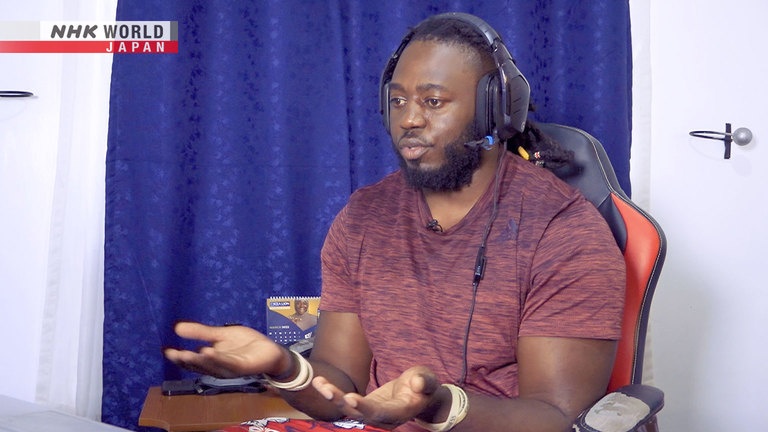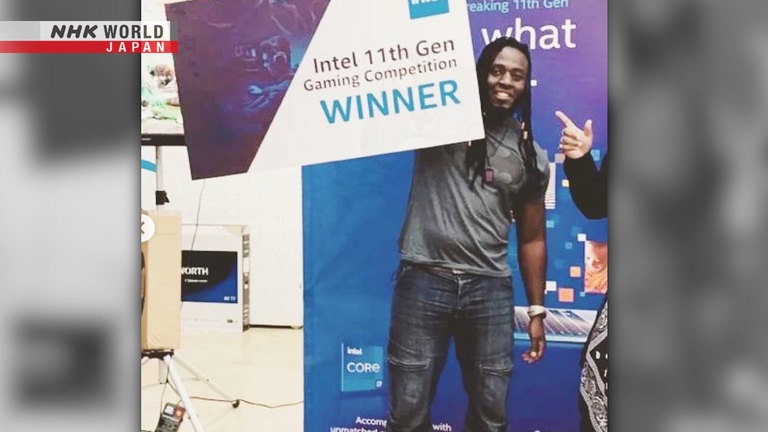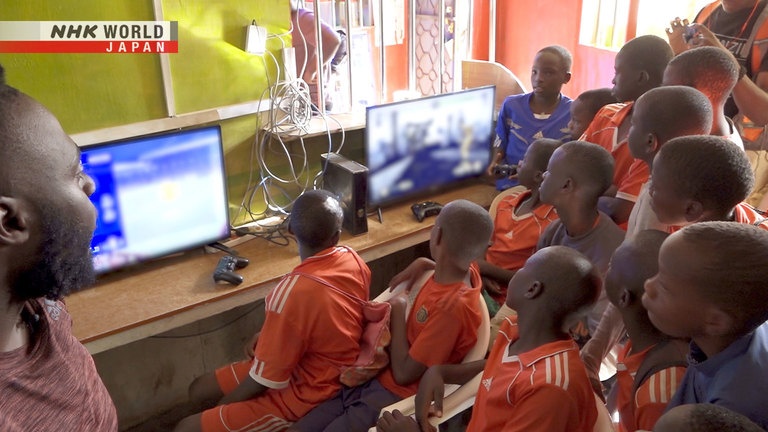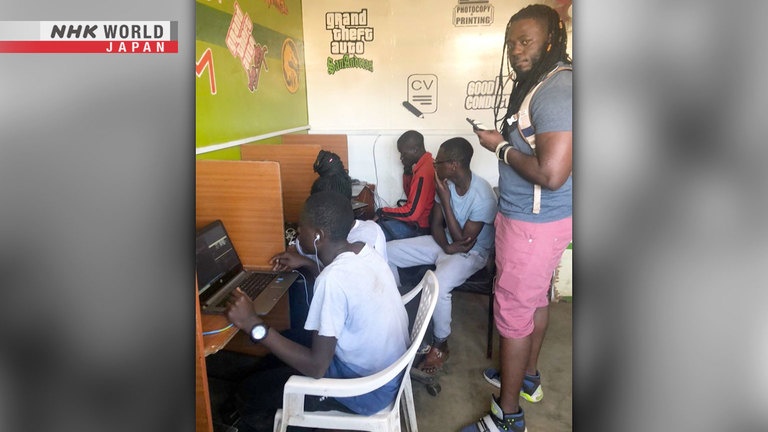Rising From the Slums as an E-Sport Professional: Brian Diang'a / Pro Gamer
Growing up in a Nairobi slum, Kenya's leading pro gamer didn't even own a pair of shoes, let alone a game console. Today, he uses his prize money to help slum kids find a better future.




Transcript
Direct Talk
Kibera slum in Nairobi, Kenya.
A man is working hard to help shine a light
of hope on the young people who live here.
He's Brian Diang'a, who was born in a slum.
His special skill is gaming,
and he is one of the most talented
professional gamers in the country.
In places like this in the slums, like
everything is bad.
But the sense of community
can help you grow depending
on what you know.
The gaming industry
is very popular in Africa.
What can it bring to the issue of poverty?
To find out, we interviewed Brian.
Rising From the Slums
as an E-Sport Professional
My official names are Brian Diang'a,
and I've had many nicknames before,
but the nickname that has stuck out
and what people call me
by this day is "The Beast."
And this is because of the e-sports
part of gaming that I chose. Yes.
If we counted like roughly, I would say
the number of pro players
in Kenya might be 450 to 650.
If we wanted to do something solid,
those numbers are not enough.
But there are new faces that are playing
like competing and
they're calling themselves pros
and they're doing it so well.
So it's safe to say that
the number is steadily going up. Yeah.
Worldwide, the gaming industry has a
player population of over 100 million.
Even though small in scale so far,
Africa is attracting attention
as a new market with
its large number of young people.
Kenya is the top African gaming country.
Its professional gaming league
was created in 2018.
Brian has made a name
for himself in the industry
as a professional gamer from the slums.
He showed us the place where he grew up.
So this is where I call home. Yeah.
So where the place that got burnt down
is right in the middle of this,
but they've rebuilt it already, I see.
These are the toilets.
Somebody else's house. Yes.
So, yeah, this was my place.
I was supposed to live here, but
that place on the behind of it got burned.
So it doesn't exist anymore.
But this is where I used to live, yeah.
He says that his family was
very poor when he was a child
and he didn't even own a video game console.
So at the moment this is my old,
but working gaming chair.
Uh, a console gamer? Yes.
But this is what should be my hand,
like this.
Brian's specialty is a fighting game
called Mortal Kombat.
He has won top prizes in national
and East African competitions,
and is known as a very strong player.
When it comes to the skill level,
I'm still practicing.
This is like Messi and Cristiano.
These people, what do they do?
They wake up and they go to the pitch,
and after that, they go to the other pitch.
The first pitch is for them
to train themselves.
The next pitch is where they perform.
And they are pro footballers. Yeah.
Same thing with people who do video games.
Those people who put in so much time
also are the best of us.
Prize money for gaming tournaments
runs into the hundreds of dollars,
which is about the monthly income
of a Kenyan office worker.
Only a handful of people in the world
can make a living from game income.
How did Brian come
to be a professional gamer?
He was born in 1992 on the outskirts of Nairobi
as the eldest of six siblings.
He learned about the profession of
professional gamer when he was about 20,
through a video he watched
during a break at work.
I was working as an intern illustrator
in a company called Scanner
and it was an advertising agency.
Then one day I stumbled on a video on a clip
from a tournament from Mortal Kombat 9.
And by then, me, ever since I was a kid,
Mortal Kombat was my go-to game.
Like everywhere I went, there was
Mortal Kombat and I was good at it.
So when I found out people were actually
playing Mortal Kombat and getting paid,
I was like, "Damn!"
And that guy won almost, I think, 100,000 USD,
you know, for us what 100,000 USD
that is life changing,
you know, that is I was like,
"This guy is doing the same thing I do,
but he's doing it way better and
he's also even getting paid for it."
Brian has loved video games since childhood.
He used the money from working to go
to a game arcade and hone his skills.
He had a strong desire
to become a professional gamer,
but he says his skills were
only at amateur level at that time.
And then I had a small mishap
and I had to move out to Egypt.
I was doing a job on hotel animation,
just standing the whole day.
So during the breaks, which I had,
I had only two breaks.
And then, I would challenge the guests
who came to the hotel
to play with me, Mortal Kombat,
because I realized most of them
were coming from Europe and Asia.
For me it was like a good place,
a learning curve for me to grow
myself as an e-sport athlete.
So I started playing with these guys
and slowly I started getting the gist
of how it is to play with professionals
against what I was doing,
which was just playing alone.
And in the next year, 2015,
they hosted the first
Mortal Kombat tournament in Kenya.
and I got to third place.
He continued to compete
and perform well in competitions
and took second place in the official
East African competition held in 2017.
He finally won the
first cash prize of his career.
I was the happiest human being ever.
I went to school almost
until I was an adult with one shoe.
I had one pair of uniform,
like I had to wash it
every time I came from school.
I used to starve so much
because we didn't have food at home.
Like I even got a problem from that stuff.
Like, I can't have
more than two meals in a day.
That was too much money to
just get in a sitting of like 8 hours!
That was like two miles.
I was like, "Damn, these people,
they've given me so much money!"
It was the best feeling ever.
Brian's success story was also
covered by the national media.
He has established a solid position
as a professional gamer.
But like for me right now, it's not
just about winning. I don't want to win.
You know, it's fun to win
when there is 1,000 or 2,000 people,
and you can say comfortably, you know,
"I'm number two out of 1,000 people." You know.
We're not that many.
I think gaming would be the best work to do.
So for me right now I feel like,
"Yeah, let me just pave the way for people."
There's an activity that
Brian has been involved in.
It's providing support for children
living in slums through games.
I just do general mentorship
for when it comes to Kimbra.
Once in a while I picked them.
Those who are interested
in gaming, I picked them.
I take them to the place
where we would go later,
show them one or two things or...
Sometimes I didn't even show them.
I just sit there and I watch them have fun.
I just want them to be like, "Have fun."
"If you have a question, ask me what
you're doing wrong, I will show you." Yeah.
Fighting games, soccer games, and more...
He rents a game cafe in the slum
several times a month
and let's children play games.
I grew up in... I would say
very harsh conditions.
I grew up in a family
where I didn't have anything.
Most of my friends became thugs
because they couldn't do jobs.
They had nothing. So they said,
"You know, let's go and steal."
And for me, lacking is the cause of
so many problems in this world.
You lack, you'll be pushed to do something
that goes against your morals,
goes against, you know, like lacking just
gets you to do unwanted things in your life.
And at the end of the day, you end up losing
more than what you could gain from it.
And most of them don't have
access to Internet or whatnot,
so they don't know a lot of things
that are happening out there in the world.
So my job is just to show them like,
"Hey, this place, this place is small,
but the world is big and it's ready for you."
For me. I don't want them to be...
me.
I don't want them to be pro gamer.
I want them to be
what they want to be at 100%.
You know, if it's being an artist,
I want to be the best artist.
If it's being a musician,
I want to be the best musician.
We lack people who tell people this.
"Be you."
"Be the best version of you."
This is what I usually tell them.
Through games, Brian wants children
to be aware of the world outside the slum.
He has been carrying out
this activity for nearly five years.
And that's not all.
He also provides the slum
with livelihood support.
I do collecting books,
filling libraries in the slums, the schools
which I do. I do it
with my friends. I collect.
Also, during Corona,
I used to buy food like a lot of it,
and give out to families that lost
their jobs, families that are struggling.
So since 2019 to late 2021,
I think every month
I was buying food for families.
I started with like 30 families
and in the end I was doing
for like 200 families
until I got broke!
That's where I stopped.
Using his raised profile,
he is also working hard to boost
the Kenyan gaming industry.
He actively organizes events and tournaments.
What he is trying to change is
the negative attitude towards games,
such as violence and dependency.
You know, most of also the adults,
the people who have the money,
the older generation,
they don't understand anything
to do with electronic arts.
They don't understand video games.
Let's say people at a UFC match.
Yeah. You know,
UFC people at the UFC match,
they go there, they drink alcohol
and enjoy watching people fighting. Yes?
But do they actually go out
and do what the UFC guys are doing?
No, they don't.
Same with video games.
We know this is not reality.
We know this cannot work in reality.
People just take
this one aspect of its violent
But I just say,
"Humans, by nature, we are already violent."
I mean, they're what's going on.
They are not inspired by video games.
They're inspired by us.
We are all violent by nature.
The health hazards caused by dependence
has become an issue in recent years,
especially in Asia.
What does he think about that?
Yes, addiction is there, but with the settings
we come from, it's not that comfortable.
For instance, you have to go fetch water.
Like, really, like...
most of the slum dwellers
don't even have tap water,
don't even have toilets in the house.
If you need to get food,
there is no like you don't even have a space
in your house to put a fridge in.
So you're basically
hand-to-mouth kind of person
when with that setting, I don't see
how you are able to be addicted.
But I would give them a list of things
that are positive that could pick
from video games.
Like for instance, even for us,
our national language is not English. Yeah?
There is no video game in Kiswahili.
There's only video games in English
and those other languages.
So when for me as an African gamer
starts gaming, what do I have to do?
I actually have to learn English.
Am I going to do that in class?
Yes, but most of it I'm going to
get from the game. Yeah.
Me speaking English, I've learned
speaking English from video games.
It's that simple. I learned
speaking English from video games.
In August 2021,
together with a Japanese IT company,
he organized a programming class
for children living in the slum.
He is exploring the possibilities
that games and computers can bring.
So what is Brian's goal?
I don't know my goal is just
to be the Africa Gaming Ambassador?
I just want to preach gaming
everywhere I want.
I want those big companies to bring.
So I want to create
the communities to be available
to have those big sponsorship
like Samsung, Coca-Cola,
whatnot, to come and
sponsor games from Africa.
And let's just make
the African gaming ecosystem.
That is what is in my head.
Like Asia has its own gaming ecosystem,
Europe has its, America has it.
So I feel like I want to be in the center
of creating Africa's gaming ecosystem.
Like, that is my dream.
Because for me it has done
so many things for me.
I know our lives are different out here,
but I believe it can do so much more
for so many other people.
And it's something I love
deep down in my heart. Yes.
Finally, we asked Brian to tell us his motto.
Never give up!
So in as bad as it looks,
just know that you can handle.
And that's what I told myself.
And I just keep pushing myself.
I'll try to make a way.
If not, I'll find a different route
to make the way work.
But I won't give up. Yes.
Never give up!